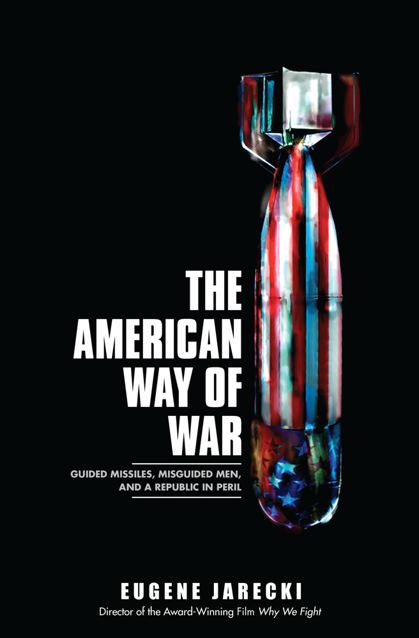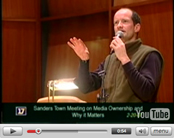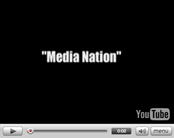Discuss E-List
Essential Resources Guide
FREE Teaching Resources
Membership Benefits
Partner Discounts
Summit 2006
BOOK REVIEW: Eugene Jarecki's THE AMERICAN WAY OF WAR

Booking the Empire: “Why We Fight” Filmmaker Makes His Case In Print
What happens when an award-winning documentary film producer turns to a print monograph to make his case?
If you are Eugene Jarecki, the answer (to borrow a baseball metaphor) is: you hit a solid triple, with an eye towards home plate.
Jarecki’s new book – The American Way of War: Guided Missiles, Misguided Men and a Republic in Peril (Simon and Schuster, 2008; 324 pages) – is a provocative and personal exploration of the same crucial themes he explored in his Sundance Film Festival 2005 Grand Jury Prize-winning documentary “Why We Fight.” Ignore Jarecki’s “confession” to being “first and foremost a filmmaker” on page 1, rather than a “policy scholar, a soldier” or an “insider to the workings of America’s military establishment.”
Pay his humility no mind. Jarecki possesses a keen eye for detail, an ability to listen closely to his subject’s personal and professional motivations (and the often-felt tension between the two), and a knack for speaking synechdocally – that is, using individuals and moments to illustrate larger systemic and historical truths, and the reader is the better for it.
The book begins, as his film does, with President Dwight David Eisenhower’s 1961 “Farewell Address,” in which the prescient Ike warns Americans to guard against the dangers of the “military-industrial complex,” that potent and profit-seeking combination of special interests that might spell the death of the U.S. republic. Jarecki then takes us on a historical and global tour of the United States, from its early 20th century emergence as a global imperial force to the present moment, with some remarkable stops along the way, from interviews with air force pilots and West Point cadets to conversations with those in the highest levels of government, including Richard Perle and Republican presidential candidate John McCain, who proclaims the United States to be “the greatest force for good in the world today.”
How McCain measures this goodness is, of course, a matter for readers to ponder, given the economic and political realities of our current moment, and Jarecki’s book, while wisely steering clear of an attempt to exhaustively chronicle America’s empire-building abroad, explores the historical tension between America’s desire to remain a neutral, even isolationist player on the world stage, and its desire to build an Empire. Eisenhower, for whom Jarecki has deep admiration (as have I, even more so after reading Jarecki’s book) remains the central figure here, walking a remarkable line between competing pulls on his loyalty as a military man, a policymaker, and a compassionate human being in a tough position of leadership.
Not surprisingly, as Eisenhower himself warned, the war-making and profit-taking interests have dominated this debate during the past sixty years, and Jarecki takes pains to explain the nuances that undergird the building of the most powerful (and expensive) Empire in world history. His final chapter – “Shock and Awe at Home” – is a referendum on the past eight years of King George’s administration. For anyone who is unfamiliar with or has forgotten how the USA PATRIOT Act, or John Yoo’s new and novel legal theory of “the unitary executive,” or the John Warner and Military Commissions Acts, or the FISA nonsense, or dozens of other presidential abuses of power have reshaped the federal government’s very essence over the past eight years, a close reading of this chapter alone is worth the price of the book. And I am not comforted by the conclusion most observers make here – that, once Mr. Bush exits office stage right, somehow everything will “return to normal.” Sunset clauses somehow provide little comfort here.
Speaking critically, as a U.S. historian and secessionist/ decentralist, my arguments with Jarecki’s book are not insignificant. I find troubling his refusal to touch the mountain of evidence – the scholarly and well-researched work of David Ray Griffin or Michael Ruppert, for example - that suggests that the 9/11 attacks served as a “false flag” operation engineered by elements within the U.S. government to advance a “new Pearl Harbor.” This is an odd omission, since this phrase is one he uses repeatedly in the book, quoting the Project For A New American Century’s statement calling for a new “defensive” posture - one that essential advocates a policy of “full spectrum dominance” in which the U.S. militarizes the entire globe and outer space. (Orwell would be nodding knowingly right now.)
Jarecki’s otherwise spot on “iron triangle” analysis - in which he masterfully considers the intricate interconnections among the U.S. military, profit (and war) seeking global corporations, and both the legislative and executive branches - largely leaves out the vital role of U.S. media and “news” outlets as propaganda arms for war-making (General Electric manufactures weapons systems for the Pentagon AND owns NBC, which hypes war 24/7. This is not a coincidence).
And, perhaps most importantly, Jarecki chooses to downplay the tremendous amount of money U.S.-based multinational corporations (and the politicians who front for and work with them – Dick Cheney, Don Rumsfeld, and the current occupant of the White House, He Who Must Not Be Named) have made supporting what former Bush I insider-turned whistleblower Catherine Austin Fitts calls “the tapeworm economy.”
The country of Iraq is a perfect example here. Let’s connect the dots: the U.S. military-industrial-media-energy-complex makes money bombing and destroying Iraq (Ka-ching!), “rebuilding” Iraq, often badly and/or corruptedly (Ka-ching!, Part 2), while privatizing all of its assets (Ka-ching! Part 3). Oil, black gold, is the bloody tip of the spear point here, as 1 million Iraqis have died since the U.S. 2003 invasion, 2 million more have been displaced, and the U.S. taxpayers have been left footing what Nobel Prize winning economist Joseph Stieglitz has estimated to be a $3 trillion dollar war (“on terror, that “will not end in our lifetimes,” according to Mr. Cheney.)
If I sound outraged, I am – and, while I deeply appreciate Jarecki’s willingness to listen to all sides, I found myself wishing he’d take off the gloves, at times. But I am also willing to own my own sense of outrage, and laud Jarecki for his vital contribution to this important and unfolding conversation about the future of the United States under the regime that is the “military-industrial complex.” In turning to typography, filmmaker Jarecki has produced what many will see as a minor tour de force, an important book at a pivotal moment in the history of the United States republic-turned-empire.



![View your cart items []](/sites/default/modules/ecommerce/cart/images/cart_empty.png)





